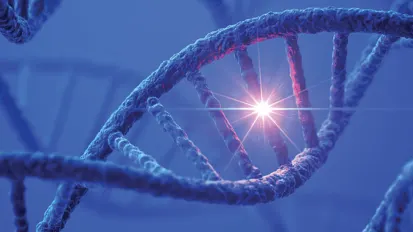Cancer… Two studies that were published in the magazine Nature show how important the Y gene is to understanding why men get cancer more often than women.
Most animal species get their male traits from their Y gene.
The first of these studies was led by Dr. Ronald A. DePinho from the MD Anderson Cancer Centre in Houston, Texas. It was about colon cancer, which is the second most deadly cancer in the world.
Men tend to get this kind of cancer more often, and it tends to be more deadly and common in men.
Using a genetically modified mouse model with a gene called KRAS that is known to cause cancer, Dr. DePinho and his team found many links between mice and people.
Dr. DePinho said, “In male mice, we saw more malignant tumours and worse outcomes, which is similar to what we see in people.”

It looks like a gene on the Y chromosome that isn’t being controlled is to blame.
Dr. DePinho also said, “This gene plays a role in driving tumour invasion and immune evasion. This may explain why KRAS-related colorectal cancer develops differently in men and women.”
We found a gene on the Y chromosome that makes men’s colon cancer worse. This gene has an effect on other parts of cancer cells’ ability to spread and hide from the immune system.
In a different study, Dr. Dan Theodorescu, who is the Director of the Samuel Oschin Comprehensive Cancer Institute at Cedars-Sinai Medical Centre in Los Angeles, looked into the effects of Y chromosome loss, which is seen in many types of cancer.
They also found that bladder cancers without a Y chromosome were more invasive and had a T-cell-driven immune-responsive invasion.
T cells are part of the defence system. Stem cells in the bone marrow turn into T cells. They keep the body from getting sick and may help the body fight cancer.
In a study of 300 men with bladder cancer, the loss of Y chromosomes was linked to a bad outcome.
Even though Dr. DePinho wasn’t part of this bladder cancer study, he told The National what he thought about it.
He said, “The Y chromosome can play different roles in different types of cancer, and because it has so many genes, it can be hard to figure out what will happen if it is lost.”
These studies show possible ways to come up with treatments that are made just for guys.
Dr. DePinho said, “Male colorectal cancer patients, especially those with KRAS mutations, may need to take more preventative steps to keep the cancer from coming back.”
“Standard immune therapies might not help these men because cancer cells can hide from the immune system.”
Dr. DePinho said, “Males with KRAS-mutant colorectal cancer may need drugs that neutralise the suppressive functions of the specific Y-chromosome-encoded gene, KDM5D,” when talking about what their results mean for immune evasion.
He gave reassurances about the risks or limits of targeting the Y chromosome, including the use of histone deacetylase inhibitors, a relatively new class of anticancer drugs.
Dr. DePinho said, “We don’t think that neutralising KDM5D will have any bad effects.”
Also, histone deacetylase inhibitors, which could be a part of such treatments, are already thought to be safe enough for patients to use.
He said that these findings show how important the Y chromosome is for understanding and treating cancers that affect men and women differently.
These results can help guide future study, which could lead to more effective and individualised treatments for cancer in guys.
